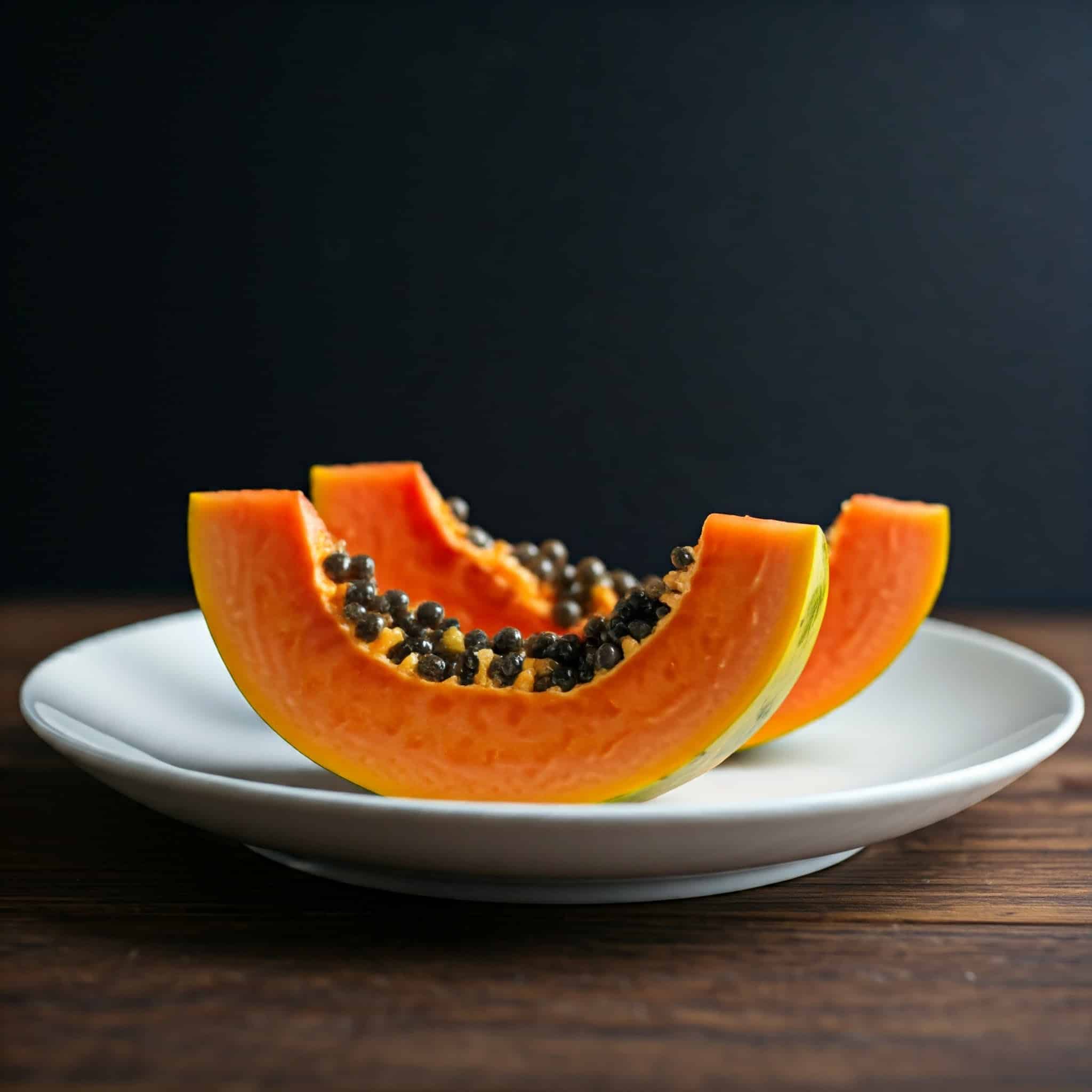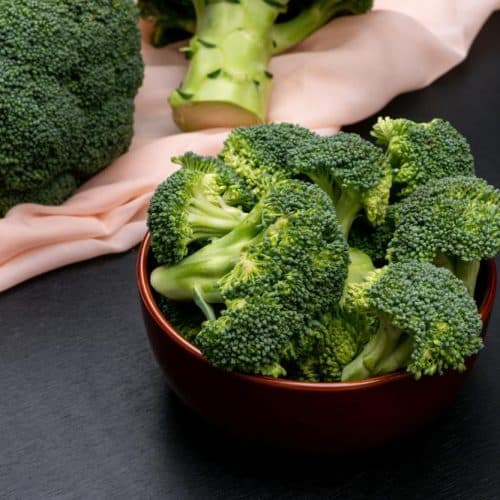Papaya, also known as papaw or pawpaw, is a soft, fleshy fruit of the plant species Carica papaya. Originating from Central America, this tropical delicacy has made its way across borders. India tops the chart in papaya production, producing over 3 million annually. The enticing orange hue, sweet flavour, and an array of nutrients make papaya an exceptional addition to any diet. The nutrients in papaya offer a range of health benefits, including protection against various health conditions, boosting the immune system, aiding digestion, and promoting skin health.
This blog will delve deeper into what contributes to papaya’s impressive nutritional profile, understand its myriad health advantages, explore various ways to consume this powerhouse fruit and decode its side effects.
What is the Nutritional Value of Papaya?

sliced papaya with seeds
Packed with vital nutrients, papaya is indeed a superfruit. A medium papaya contains approximately 120 calories, 30 grams of carbohydrates (including 5 grams of fibre and 18 grams of sugar), and 2 grams of protein.
Besides, papayas are an excellent source of vitamin C, folate, vitamin A, magnesium, and fibre. They also contain a good amount of B vitamins, alpha and beta-carotene, lutein and zeaxanthin, vitamin E, calcium, potassium, vitamin K, and lycopene, the potent antioxidants associated with tomatoes.
Vitamins and Minerals
Papayas are a rich source of several vitamins and minerals that contribute to overall health:
| Vitamins and Minerals | Milligrams (mg) per medium papaya |
| Calories | 120 |
| Protein | 2g |
| Carbohydrates | 30g (5g of fiber and 18g of sugar) |
| Folate | 115µg |
| Vitamin A | 1504µg |
| Magnesium | 61mg |
| Vitamin C | 224.1mg |
| Fiber | 3g |
| Vitamin E | 0.5mg |
| Calcium | 73mg |
| Potassium | 502mg |
| Vitamin K | 6.6µg |
| Lycopene | 1828µg |
Fiber Content
Fibre is an essential part of a healthy diet, aiding digestion, promoting weight loss, and lowering cholesterol levels. One small papaya provides nearly 3 grams (g) of fibre, contributing to the daily recommended 25g to 30g fibre intake. Serving as a filling element in diets, fibre also helps regulate blood sugar. This makes papaya a choice of fruit for people with type 1 and type 2 diabetes.
Also, read our blog on 10 Foods to Lower Blood Pressure.
Top 12 Health Benefits of Papaya
Are you looking for a natural way to boost your health and well-being? Look no further than the humble papaya. This tropical fruit is packed with essential nutrients and health-promoting compounds. It offers a wide range of benefits for your body and mind. With its versatile nature, papaya is a delicious way to support overall health and well-being. This section will dig into papaya’s top nutritional and health benefits.
Vision and Eye Health
Papaya’s benefits extend to vision and eye health due to its rich content of vitamins A, C, and E, which are essential for maintaining good eyesight. Vitamin A plays a crucial role in preventing age-related macular degeneration, while vitamin C helps reduce the risk of cataracts. The antioxidants in papaya, such as beta-carotene, lutein, and zeaxanthin, protect the eyes from oxidative stress and sun damage.
These nutrients also support collagen production in the eyes, which is vital for overall eye health. Including papaya in your diet can contribute significantly to preserving your vision and promoting eye wellness.
Asthma Prevention
Papaya’s anti-inflammatory properties may help prevent asthma by reducing airway inflammation and respiratory distress. The presence of beneficial vitamins and antioxidants in papaya supports lung health and may alleviate asthma symptoms. Studies suggest that regular papaya consumption can lower the risk of developing asthma and improve overall respiratory function.
Additionally, the high vitamin C content in papaya aids in reducing wheezing and breathlessness associated with asthma. Including papaya in your diet is a natural and delicious way to support respiratory health and combat asthma symptoms.
Remember to consult a healthcare provider for personalized advice on managing asthma effectively.
Cancer-Fighting Properties
Recent studies have revealed that papaya exhibits promising anticancer properties, making it a valuable addition to cancer-fighting diets. The presence of powerful antioxidants in papaya aids in combating free radicals that can cause oxidative damage, leading to cancer.
Moreover, the enzyme papain in papaya has shown the potential to inhibit the growth of breast cancer cells. Research suggests that regular consumption of papaya may help reduce the risk of prostate cancer. These cancer-fighting properties make papaya crucial in promoting overall health and well-being.
Incorporating papaya into your diet can potentially contribute to your body’s defence mechanisms against cancerous cells.
Bone Health
Papaya benefits extend to bone health due to its rich nutrient profile. This tropical fruit contains essential vitamins and minerals like vitamin C, K, and calcium, all crucial for maintaining strong and healthy bones.
Vitamin C aids in collagen formation, which is important for bone structure, while vitamin K supports bone mineralization. Calcium, a key mineral in papaya, contributes to bone density.
Including papaya in your diet can help prevent bone-related disorders like osteoporosis and improve overall bone health. The combination of these nutrients in papaya supports bone strength, making it a valuable addition to a bone-healthy diet.
Diabetes Management
Papaya’s low sugar content and high fibre content contribute to its benefits for diabetes management by aiding in blood sugar regulation. The presence of antioxidants like vitamins C and E in papaya helps reduce oxidative stress, which is beneficial for diabetic individuals.
Moreover, the fibre content supports digestion, preventing sudden spikes in blood sugar levels. The enzymatic activity in papaya may also contribute to insulin sensitivity.
Including papaya in a well-balanced diet could potentially help in managing blood sugar levels for individuals with diabetes. Studies suggest that regularly consuming papaya may play a role in supporting diabetics’ overall health and wellness.
Digestion Improvement
Enjoy improved digestion with papaya, thanks to its fibre and papain content that aids in protein breakdown. The fibre facilitates bowel movement, preventing constipation and promoting overall digestive health. Enzyme papain helps the body digest food more efficiently, reducing bloating and indigestion.
Additionally, papaya’s water content helps maintain a well-hydrated digestive tract, further enhancing digestion. By consuming papaya regularly, individuals can potentially alleviate digestive issues and promote a healthier gut environment.
Incorporating this tropical fruit into your diet can significantly improve digestion and overall well-being. Unlock the digestion-boosting advantages of papaya for a happier tummy.
Improves Kidney Health
Papaya’s potent antioxidant properties help combat oxidative stress, which is crucial for maintaining kidney health. The high water and potassium content in papayas support kidney health by promoting hydration and electrolyte balance.
Additionally, the fibre in papayas aids in proper digestion, preventing issues that could potentially impact kidney function. Consuming papaya regularly can assist in reducing the risk of kidney disease and promote overall kidney health.
This tropical fruit’s contribution to kidney health makes it a valuable addition to a balanced diet.
Heart Health
Papaya can contribute to heart health by lowering cholesterol levels and reducing the risk of heart disease. This tropical fruit contains powerful antioxidants that combat oxidative stress, thus protecting the heart from damage. The high fibre content in papaya aids in maintaining healthy cholesterol levels, particularly in reducing LDL cholesterol.
Additionally, vitamins C, E, and K in papaya contribute to overall cardiovascular well-being. Including papaya in your diet can help improve heart health and reduce the risk of heart-related ailments.
Make the most of this delicious and versatile fruit to nourish your heart and enhance your overall well-being.
Skin Protection & Repair
Papaya’s skin benefits stem from its nutrient-rich profile, which aids in protection and repair. The high levels of vitamin C in papaya help in collagen formation, promoting skin elasticity and fighting wrinkles. The presence of vitamin E aids in nourishing and hydrating the skin, preventing dryness and damage from UV radiation.
Additionally, papaya’s antioxidant properties protect the skin against free radicals, reducing oxidative stress and premature ageing. Topical application of papaya extract or pulp can also assist in wound healing and reducing inflammation, contributing to overall skin health and radiance.
Embrace papaya as a natural ally for maintaining youthful and healthy skin.
Weight Loss Treatment
Papaya’s low-calorie and high water content can aid in weight loss by promoting digestion and satiety. The enzyme papain in papaya assists in breaking down proteins, supporting a healthy digestive tract and metabolism.
Additionally, the fibre content in papaya promotes satiety, controlling hunger pangs and reducing overall calorie intake. Incorporating papaya into your diet today may help with weight management by offering a nutritious and delicious alternative to high-calorie snacks.
This tropical fruit not only satisfies your sweet cravings with its natural sugars but also supports your weight loss goals through its nutrient-rich composition.
Dengue Treatment
Papaya’s potential in dengue treatment lies in its enzymatic properties. Research suggests that the enzymes present in papaya, such as papain, help reduce symptoms of dengue fever by increasing platelet count.
Moreover, the high vitamin C content in papaya boosts the immune system, aiding in faster recovery from dengue. This tropical fruit also provides essential nutrients supporting overall health and well-being during recovery. Papaya’s hydrating properties and easy digestibility make it a suitable addition to the diet of dengue patients.
With its natural anti-inflammatory and immune-boosting properties, papaya is a promising addition to the treatment regimen for dengue patients.
May Slow the Progression of Alzheimer’s Disease
Papaya contains carotenoids and vitamin C, acting as potent antioxidants that may help combat oxidative stress in the brain, potentially slowing Alzheimer’s disease progression. Studies suggest that the carotenoids present in papaya can support brain health by reducing oxidative damage and inflammation, key factors in Alzheimer’s development.
The rich vitamin C content in papaya aids in bolstering the immune system and protecting brain cells from damage. By incorporating papaya into your diet, you can benefit from its neuroprotective properties, offering a delicious way to mitigate the effects of Alzheimer’s disease potentially. Unlock the secrets of papaya and its potential to support cognitive health.
How to Consume Papaya?

different ways to consume papaya
Enjoying papaya is simple and easy. Fresh papayas with soft, red-orange skin are preferred. Cut it in half, scoop out the seeds, and enjoy. The seeds are edible but have a bitter and peppery taste.
Other ways to eat papaya include adding slices to fruit salads or blending them into smoothies. Papaya can also be muddled into lemonade, made into salsa for a fruity twist, used as a topping for fish tacos, or frozen and then added to smoothies.
For more papaya recipe ideas, check out Awesome Cuisine.
What are the Possible Side Effects of Papaya?
Like any food, papaya has potential side effects. Some people might experience an allergic reaction after consuming papaya, characterized by skin irritation or digestive discomfort. Unripe papaya contains papaya latex, which has an enzyme called papain. Consuming large amounts of this enzyme can damage the oesophagus. Also, people with a latex allergy may need to be cautious with papaya and products containing papaya.
Allergic Reactions
Allergic reactions to papaya can range from mild to severe. Here are some common symptoms:
- Skin rash or hives
- Itching or tingling sensation in the mouth
- Difficulty in swallowing
- Swelling of the face, lips, tongue, or throat
- Abdominal pain or discomfort
If you experience any of these symptoms after eating papaya, it’s important to seek medical attention promptly.
Interactions with Medications
Papaya can interact with certain medications, particularly:
- Blood thinners: Papaya has a blood thinning effect and can increase the effect of these drugs.
- Diabetes medications: Papaya may affect blood sugar levels, potentially interfering with the efficacy of diabetes medications.
- Sedative medications: Papaya may enhance the sedative effects of certain drugs.
- Warfarin: Papain, an enzyme found in papaya, can interfere with this medication.
Therefore, if you are taking any of these medications, consult with your doctor before incorporating papaya into your diet.
Conclusion
Known for its sweet taste and high nutritional value, papaya is more than just a tropical treat. This power-packed fruit brings together a host of nutrients, making it an excellent addition to our diets. Papaya’s health benefits span various domains, including heart wellness, digestive health, skin and hair beautification, and much more. Its potential anti-inflammatory and anticancer properties add to the pool of reasons why papaya is indeed a superfruit.
The vibrant orange-coloured papaya is a treasure trove of health and wellness, deserving to be relished and appreciated. With so many incredible benefits, it’s clear that adding papaya to your diet is a smart choice for your overall health. So why wait? Start enjoying the numerous advantages of this tropical fruit today and experience a healthier, happier you.
Frequently Asked Questions on Papaya Benefits
Can I eat papaya every day?
You can enjoy papaya daily, considering its various health benefits. However, consuming it in moderation is essential to avoid possible side effects such as digestive discomfort.
What is the best time to eat papaya?
Papaya can be eaten at any time of the day. However, many people prefer to have it early in the morning on an empty stomach or during mid-afternoon as a healthy snack.
What organ is papaya good for?
Thanks to the abundance of antioxidants and vitamins, papaya is great for several organs, notably the heart and eyes. It is also beneficial for the digestive system due to its high fibre content.
Are there any potential side effects of eating too much papaya?
Overeating papaya may cause some side effects like bloating, indigestion, and possible allergies. Also, eating unripe papaya can potentially cause uterine contractions in pregnant women. Hence, moderation is suggested while consuming this fruit.












